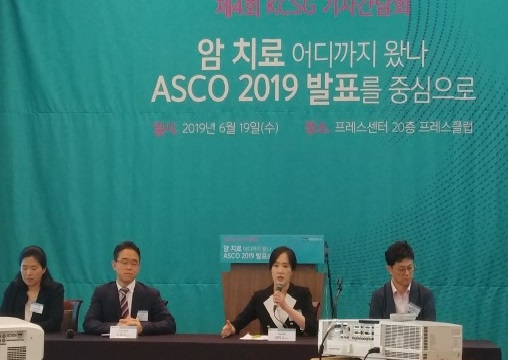Immunotherapies, less toxic than conventional cytotoxic chemotherapies, have contributed to broader use of neoadjuvant cancer therapies, better cancer surgeries and the overall improvement of survival in cancer patients, experts said.
In a news conference on Wednesday, the Korean Cancer Study Group (KCSG) presented the latest trends in anticancer treatments based on current studies introduced at the recent annual meeting of the American Society of Clinical Oncology (ASCO) 2019.
Lee Yun-gyoo, a professor at the Oncology and Hematology Department at Kangbuk Samsung Hospital, said experts at the ASCO meeting emphasized to take a multidisciplinary approach where surgeons, oncologists, radiologists, nuclear medicine specialists, and pathologists gather to decide a treatment option.

With the multidisciplinary cancer treatment, pre-operative neoadjuvant cancer therapies were becoming more popular, which used to be adjuvant chemotherapy to remove post-operative micrometastatic lesions, he said.
“In the past, immunotherapies were used to treat metastatic cancer in stage four. However, recently, they are used in stage one to three cancer patients who can receive surgeries,” Lee said.
Lee noted that in treating rectal cancer and breast cancer, physicians are now choosing neoadjuvant treatment first, perform surgery, and then go with the adjuvant therapy.
“Recently, neoadjuvant treatments are provided for colon cancer, lung cancer, nasopharyngeal cancer, and sarcoma. At the ASCO 2019, researchers presented many studies related to this topic,” he said.
According to Lee, lung cancer is so fatal that even if it is a stage one patient, the five-year survival rate is about 70 percent. By post-operative adjuvant treatment, the five-survival rate would be raised only by 5 percent, he said. However, in a study of neoadjuvant nivolumab treatment in patients with stage one to three lung cancer, nearly half of the patients showed a major pathological response meaning their status was improved to receive surgery, Lee explained.
Kim Mi-so, a professor at the Hematology and Oncology Department at Seoul National University Hospital, introduced studies of biomarkers, which have brought in precision medicine in cancer treatment.
She presented POLO trial, one of the four studies presented at the ASCO’s plenary session. The POLO study evaluated the efficacy of olaparib the maintenance first-line treatment in patients with metastatic pancreatic cancer and a germline BRCA1/2 mutation (gBRCAm).
GBRCAm, which causes hereditary breast cancer and ovarian cancer, is found in about 7 percent of metastatic pancreatic cancer patients. The POLO study showed olaparib’s excellence in progression-free survival, compared to placebo, in pancreatic cancer patients with gBRCAm whose disease has not progressed on first-line platinum-based chemotherapy for at least 16 weeks.
“The median duration of response was 24.9 months in the olaparib group, versus 3.7 months in the placebo group. This was the first study to find a biomarker in metastatic pancreatic cancer and successfully performed a targeted therapy. It was significantly meaningful,” Kim said.
Professor Kim also introduced TOPARB-B study results, saying olaparib showed excellent tumor response in genetic mutations involved in DNA damage responses, including BRCA in metastatic prostate cancer patients.
“It showed its potential as the first targeted therapy for metastatic prostate cancer,” she added.

